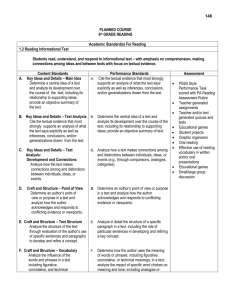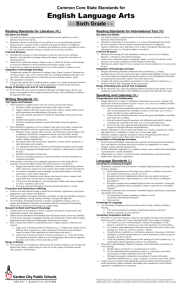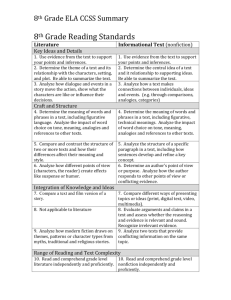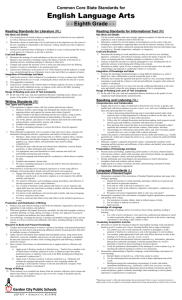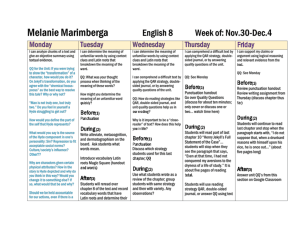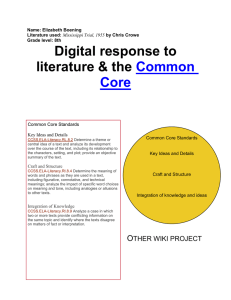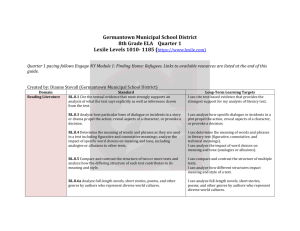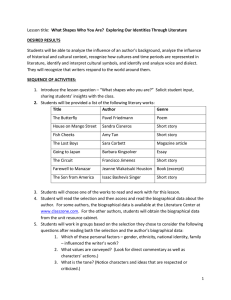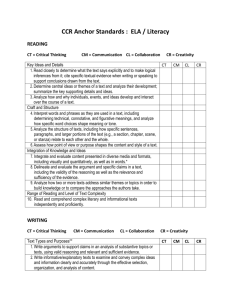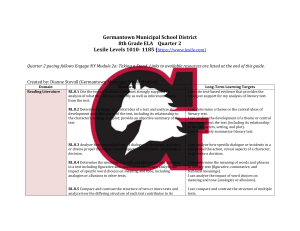Eighth Grade Language Arts First Quarter Learning Goals: 2013
advertisement
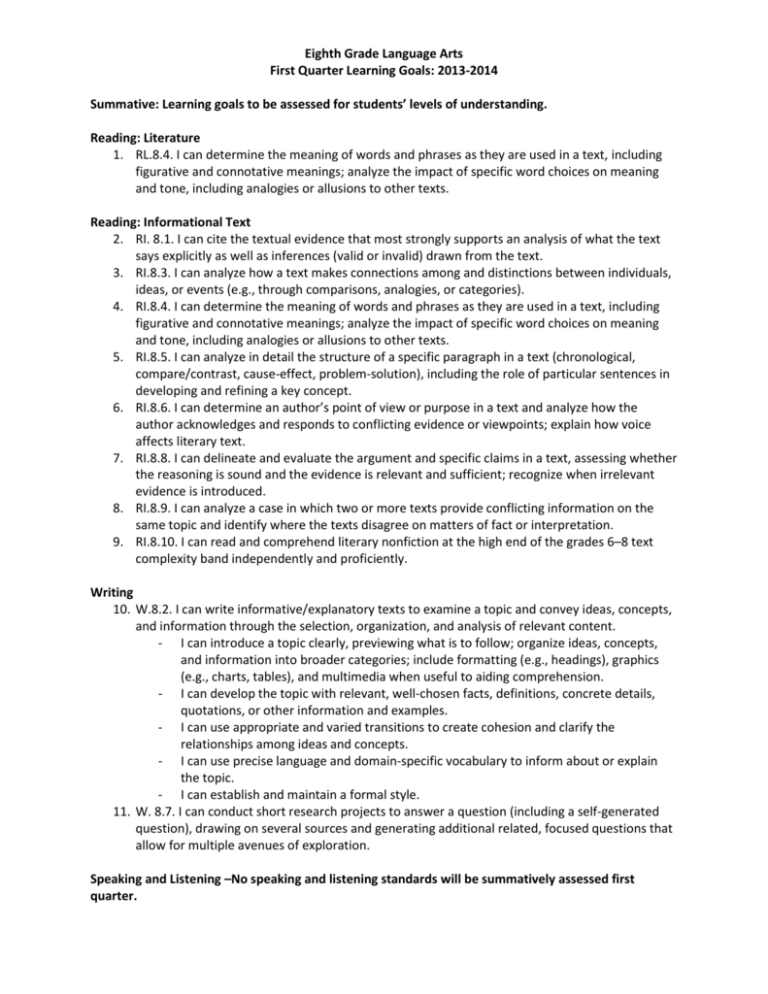
Eighth Grade Language Arts First Quarter Learning Goals: 2013-2014 Summative: Learning goals to be assessed for students’ levels of understanding. Reading: Literature 1. RL.8.4. I can determine the meaning of words and phrases as they are used in a text, including figurative and connotative meanings; analyze the impact of specific word choices on meaning and tone, including analogies or allusions to other texts. Reading: Informational Text 2. RI. 8.1. I can cite the textual evidence that most strongly supports an analysis of what the text says explicitly as well as inferences (valid or invalid) drawn from the text. 3. RI.8.3. I can analyze how a text makes connections among and distinctions between individuals, ideas, or events (e.g., through comparisons, analogies, or categories). 4. RI.8.4. I can determine the meaning of words and phrases as they are used in a text, including figurative and connotative meanings; analyze the impact of specific word choices on meaning and tone, including analogies or allusions to other texts. 5. RI.8.5. I can analyze in detail the structure of a specific paragraph in a text (chronological, compare/contrast, cause-effect, problem-solution), including the role of particular sentences in developing and refining a key concept. 6. RI.8.6. I can determine an author’s point of view or purpose in a text and analyze how the author acknowledges and responds to conflicting evidence or viewpoints; explain how voice affects literary text. 7. RI.8.8. I can delineate and evaluate the argument and specific claims in a text, assessing whether the reasoning is sound and the evidence is relevant and sufficient; recognize when irrelevant evidence is introduced. 8. RI.8.9. I can analyze a case in which two or more texts provide conflicting information on the same topic and identify where the texts disagree on matters of fact or interpretation. 9. RI.8.10. I can read and comprehend literary nonfiction at the high end of the grades 6–8 text complexity band independently and proficiently. Writing 10. W.8.2. I can write informative/explanatory texts to examine a topic and convey ideas, concepts, and information through the selection, organization, and analysis of relevant content. - I can introduce a topic clearly, previewing what is to follow; organize ideas, concepts, and information into broader categories; include formatting (e.g., headings), graphics (e.g., charts, tables), and multimedia when useful to aiding comprehension. - I can develop the topic with relevant, well-chosen facts, definitions, concrete details, quotations, or other information and examples. - I can use appropriate and varied transitions to create cohesion and clarify the relationships among ideas and concepts. - I can use precise language and domain-specific vocabulary to inform about or explain the topic. - I can establish and maintain a formal style. 11. W. 8.7. I can conduct short research projects to answer a question (including a self-generated question), drawing on several sources and generating additional related, focused questions that allow for multiple avenues of exploration. Speaking and Listening –No speaking and listening standards will be summatively assessed first quarter. Language 12. L.8.4. I can determine or clarify the meaning of unknown and multiple-meaning words or phrases based on grade 8 reading and content, choosing flexibly from a range of strategies. - I can verify the preliminary determination of the meaning of a word or phrase (e.g., by checking the inferred meaning in context or in a dictionary). 13. L.8.6. I can acquire and use accurately grade-appropriate general academic and domain-specific words and phrases; gather vocabulary knowledge when considering a word or phrase important to comprehension or expression. Formative: Learning goals to be assessed informally. Students will be provided practice and feedback about their levels of understanding on these learning goals (proficient, not proficient, satisfactory, unsatisfactory), and the learning goals will be summatively assessed in another quarter. Reading: Literature (No additional standards will be formatively assessed aside from RL. 8.4) Reading: Informational Text 1. RI.8.2. I can determine a central idea of a text and analyze its development over the course of the text, including its relationship to supporting ideas; provide an objective summary of the text. 2. RI.8.4. I can determine the meaning of words and phrases as they are used in a text, including figurative, connotative, and technical meanings; analyze the impact of specific word choices on meaning and tone, including analogies or allusions to other texts. Writing 3. W.8.1. I can write arguments to support claims with clear reasons and relevant evidence. - I can introduce claim(s), acknowledge and distinguish the claim(s) from alternate or opposing claims, and organize the reasons and evidence logically. - I can support claim(s) with logical reasoning and relevant evidence, using accurate, credible sources and demonstrating an understanding of the topic or text. - I can use words, phrases, and clauses to create cohesion and clarify the relationships among claim(s), counterclaims, reasons, and evidence. - I can establish and maintain a formal style. - I can provide a concluding statement or section that follows from and supports the argument presented. - I can cite sources of information. 4. W.8.4. I can produce clear and coherent writing in which the development, organization, and style are appropriate to task (for example how literary devices are used to enhance style and tone), purpose, and audience. Use parallel structure. 5. W.8.5. I can, with some guidance and support from peers and adults, develop and strengthen writing as needed by planning, revising, editing, rewriting, or trying a new approach, focusing on how well purpose and audience have been addressed. 6. W.8.6. I can use technology, including the Internet, to produce and publish writing and present the relationships between information and ideas efficiently as well as to interact and collaborate with others. 7. W.8.8. I can gather relevant information from multiple print and digital sources, using search terms effectively; assess the credibility and accuracy of each source; and quote or paraphrase the data and conclusions of others while avoiding plagiarism and following a standard format for citation. Speaking and Listening 8. SL.8.1. I can engage effectively in a range of collaborative discussions (one-on-one, in groups, and teacher-led) with diverse partners on grade 8 topics, texts, and issues, building on others’ ideas and expressing their own clearly. - - I can come to discussions prepared, having read or researched material under study; explicitly draw on that preparation by referring to evidence on the topic, text, or issue to probe and reflect on ideas under discussion. I can pose questions that connect the ideas of several speakers and respond to others’ questions and comments with relevant evidence, observations, and ideas. I can acknowledge new information expressed by others, and, when warranted, qualify or justify their own views in light of the evidence presented. Language 9. L.8.4. I can determine or clarify the meaning of unknown and multiple-meaning words or phrases based on grade 8 reading and content, choosing flexibly from a range of strategies. - I can use context (e.g., the overall meaning of a sentence or paragraph; a word’s position or function in a sentence) as a clue to the meaning of a word or phrase. - I can use common, grade-appropriate Greek or Latin affixes and roots as clues to the meaning of a word (e.g., precede, recede, secede). 10. L.8.5. I can demonstrate understanding of figurative language, word relationships, and nuances in word meanings. - Interpret figures of speech (e.g. verbal irony, puns) in context. - Distinguish among the connotations (associations) of words with similar denotations (definitions) (e.g., bullheaded, willful, firm, persistent, resolute)

